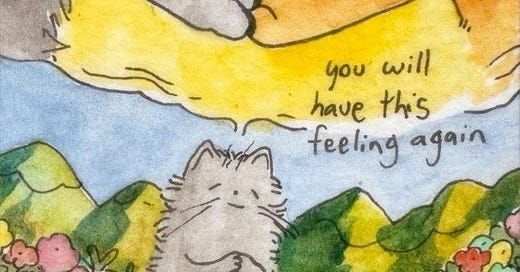“If you suddenly and unexpectedly feel joy, don’t hesitate. Give in to it. […] Joy is not made to be a crumb.” – Mary Oliver
I can only ever remember running away from joy. Joy hinges on sadness’ absence–misery is waiting by the dock, and once the tides shift, it’ll wave back eventually. Without light, there is dark; without joy, there is sadness. Seasons change, the nights grow quicker, and good moments pass.
Hence, it was easier to eschew any budding feeling and moment that might lead to overwhelming happiness. I’d rather flounder about my days in predictable routines, channeling detached emotions, than possibly induct myself into realities of temporary bliss. Joy and sadness are interchangeable and therefore inextricable.
Others might think of it as depriving myself of humanity; I thought of it as simple cautionary measures for my peace of mind. Though my days could be barren of excitement, the possibility of the week ending with myself on the ground crying for 3 hours straight was void.
The truth behind this acute fear is obvious: I am afraid of its inevitable passing. And perhaps the lesser obvious: I’ll eventually prove myself wrong that happiness can be exempt from the chronological passage of time, which to me, for some reason, just intensifies its possible precarious disappearances. If joy can transcend sequentiality, how am I supposed to prepare and predict when its next farewell will be?
There is an indictment for my joy. If I feel any form of rapture, this feeling will eventually explode out of itself and leave me even more fragile than before. It’s akin to when a child is handed sweets and is afterward forced into withdrawal. If I don’t experience it now, I won’t have to feel its absence later. I would rather sit in numbness. But do I really want to be numb? Is happiness so scary that I’d rather feel nothing than anything?
I know I am lying to myself. I want to be happy. So badly. There is nothing I have bent my knees for more than joy. It’s every old person’s dying adage: in the end, nothing matters except happiness. It succeeds every “but”: “Success is nice, but…”, “Money is nice, but…”. Everyone seems to want the same thing. Why is it so achingly difficult?
I recently stumbled upon a post that shared happiness is best felt when understood as a “coincidence”. Happiness is a coincidence precisely because it is incapable of being sought after. We cannot simply desire joy because desire implies a need for action, and not a single deed will guarantee a finale of delight. We simply have to exist; if we’re lucky, life delivers moments of bliss never expected. Like many other good things, it is transient, and I am learning to see the beauty in that.
Perhaps the resistance I’ve bred against happiness can only come undone when I give in to the truth that happiness is never still. If we view happiness as attainable, what therefore happens when it is eventually “attained”?. Positing happiness as synonymous with anything definitive is a fatal belief. We need to allow happiness to be fluid, a feeling that can flow and spill over if only we view it as a present state of being, rather than a future destination. It is not something to be deserved or fought for. It is what it presents it to be and nothing more.
It is in this belief that I have been gradually attempting to restore my relationship with joy. It is no longer something I need to think about or anticipate. As Mary Oliver says, joy is unexpected, but when it comes, we surrender. There is nothing more beautiful and liberating than to be happy. We just need to allow ourselves to be.



